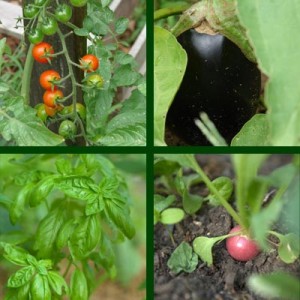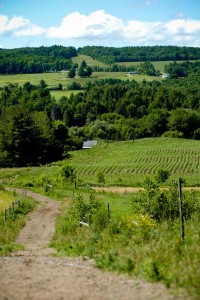Happenstance brought another glimpse into the ethics of both farming and eating. My younger brother, in his first year of college, was assigned and had read Fast Food Nation, and shared the book with Sarah and I. Reading this clarified for us how our food-buying and -eating decisions have implications beyond our own wallets and bodies, back through an extended and complex kind of food chain that goes right back to the farmers. I think after that reading, we swore off most fast-food.
But we would not yet become farmers. Concurrent with our time in Alabama, and the inklings about bringing something fair and sustainable to the family farm, I had applied to graduate school, and was later accepted. Not wanting to pass up on the opportunity, we headed off to Providence, Rhode Island where I began studies and research at Brown.
We also gave birth to our two children while in Providence. We cloth-diapered and breastfed (well, not me, exactly, literally…but anyway), initially at my request. The reason was probably economics—it was cheapest. I grew up in a household of coupon-clipping and sales shopping. Cheapness was a valued necessity for many things, especially food. It remained so for me, the grocery shopper, proud of finding a good deal and stocking up on a sale. Some of Noah’s first foods were homemade oatmeal and frozen meatballs. Eventually, the oatmeal would stay, but the meatballs were out.
Probably having Noah most fostered the growing concern about what went into our family’s bodies. I remember one early trip to the farmers’ market in Providence, where I probably bought nothing because prices there could not compare to the supermarket sales. Relatedly, a year later when another student in my department sent an email soliciting people to go halves on a CSA (organic) vegetable share, I quickly concluded the value was sub-par. Two years later, however, we would buy a share ourselves, after concluding that, indeed, I did not want to be eating or feeding food with various amou nts of pesticide and chemical residues and contaminants, nor grown in energy-intense, polluting, poor-paying manners. We also read The Omnivore’s Dilemma, I think somewhat late on our journey, but it did help cement our decisions, followed shortly by a viewing of Food, Inc. Thus Noah went from eating $1.99 per pound frozen meatballs, to eating $1.99 per pound organic tofu. (After all, money is money, and money was still tight.)
nts of pesticide and chemical residues and contaminants, nor grown in energy-intense, polluting, poor-paying manners. We also read The Omnivore’s Dilemma, I think somewhat late on our journey, but it did help cement our decisions, followed shortly by a viewing of Food, Inc. Thus Noah went from eating $1.99 per pound frozen meatballs, to eating $1.99 per pound organic tofu. (After all, money is money, and money was still tight.)
Growing up, cheap food, in fact the best cheap food, came from our garden, or from “retired” dairy cows, or from a hunt in the woods. I picked up an interest in gardening early on. Halfway through our time in Providence, we moved into a duplex with, of all things, a yard, and were able to do a bit of urban gardening and backyard-chickening. This both held-off yet fed-into our farming aspirations. As we continued to raise our growing family in the city, we did however yearn more for the agrarian lifestyle. (Not just a “rural” lifestyle though, but one actively farming to a significant extent—otherwise urban living is probably the most sustainable option to take.)
As my studies neared an end, and job prospects seeming pretty much dismal in my area of studies, we decided we would, indeed, farm. It wasn’t what we had to do, though. Sarah had a good paying social work job, not to mention a growing photography business just hitting the 3-year mark. We did think it would be good for our family, but not necessarily much or any better than what we, or our kids, already had.
 For me, a return to the family farm would be a Good Thing. It was an act hued with ethics and morals and values.
For me, a return to the family farm would be a Good Thing. It was an act hued with ethics and morals and values.
To try and make the family dairy farm as ecologically sustainable as possible was a Good Thing. To work on the economics and make it financially viable for my family seemed a Good Thing. To preserve the family farm as a family farm (I would be the fourth generation, with no one else vying for position) seemed also a Good Thing. And to produce Good Food from Good Land through Good Work—all a Good Thing.

I’m enjoying reading your story as it evolves!